SUMMARY
This is AI generated summarization, which may have errors. For context, always refer to the full article.
![[OPINION] How a Nobel Peace Prize winner helped me overcome my eczema](https://www.rappler.com/tachyon/2021/10/rapplerblog-happy.jpg)
I have lived with eczema since I was a child. I never grew out of it and continue to suffer from it as an adult. If you have it too, you know how debilitating it can be, not just physically (THE ITCH!) but also mentally.
The mental toll of eczema is as severe as its sting. It’s a constant battle, having to endure pain and discomfort while experiencing an internal struggle. I find myself trying to cope with a variety of things – teenage insecurities that never leave you, the anxiety that creeps in every time you have to choose what to wear and cover up, the stress of communicating dietary restrictions, the preparation for temperature changes, the unsolicited comments about the state of your skin and what you should do to cure eczema, and days you just choose to stay in bed because it’s hard to open your wounded eyelids. Many times, I would feel defeated before I even start the day.
Growing up, I was always interested in pursuing a career in media. I was fascinated by how it could shape the world around me and how much of an impact even 15 seconds can make in a person’s life. But I never really thought I could do it because the faces I saw were always whiter than mine, their skin clearer than mine, and their noses sharper than mine.
One day in primary school, I heard people talking about this new Filipino reporter on CNN. Cable TV was a novelty then and CNN was that glimpse of the world that was beyond me. I remember the day I saw this Filipino reporter on TV, and her name I would never forget: Maria Ressa. I saw in her not just a Filipino woman excelling on the global stage, but a face that was similar to mine. Instantly I recognized the eczema, and that was comforting. Seeing Maria on CNN signaled to me that this “world beyond me” was a world I could certainly be a part of.
From high school to university, I tried pursuing a career in the media. I started in radio and worked as a student reporter in an FM station. I would read and write announcements on board, and eventually became part of the team, albeit one with no contract or salary but only an occasional allowance. I got to be part of an evening show and co-anchored it with a controversial DJ.
But eventually, I was eased out of that job without my even knowing. There were no calls from management, no notice of termination, nothing. Just phone calls from other DJs telling me the news unofficially. With no contract or legal protection, it was done. I was replaced by another girl who the controversial DJ publicly declared to be a 9 out of 10 in terms of looks. The objectification was so strong that she was even made to attach that number to her DJ name.
In my university days, I twice auditioned to be a courtside reporter. The first time, I was rejected. The second time, I made it. Back then there was no social media, just forums. But they were just as vicious. A fellow reporter told me, “Don’t look at the forums.” But I did. And that’s where you would see all the comments about the college basketball games we were reporting on. Everything from the best players, coaches, game analyses, and even “the hottest courtside reporter.” Someone started a poll. I thought maybe I could get some useful feedback, but all I saw was that I came in last, without a single vote. Someone said, “She’s good but she’s not pretty.” And the comments for the pretty girls would say, “She’s not a good reporter, she keeps messing up her lines, but she’s sooo hot.”
Those experiences left me feeling disillusioned by the media. To me it was an industry obsessed with looks (even in radio where you can’t see the presenter!) and pandered to the male gaze. Individual voices were lost in the cesspool of the mainstream. For something that was larger than life, it had such a limited world view. I told myself, it’s not for me. And people around me told me the same thing as well: maybe it’s best to just stay out of it because with my eczema, I will never be able to compete with other reporters and their looks.
And then in 2012, Rappler came along. There she was again, Maria Ressa. This time I saw her with other badass female Filipino journalists. Rappler stood for more progressive values. As a digital native, it had the freedom to rid itself of the usual expectations of large broadcast media. I eventually found myself working for Rappler in 2016 and experienced having Maria Ressa as my boss. There I experienced first-hand her infectious energy and the relentless motivation that she always carried with her. Looks were not a factor here. Whereas other media put a premium on looks, Rappler put a premium on your ability to deliver journalism.
My stint with Rappler was a short one because I then migrated to Australia. My eczema got worse when I moved to Sydney – new seasons, new allergens, and just a whole new level of weather extremes. It was hard to start anew and there were more days of physical and mental suffering because of my eczema. Finding the energy and motivation to forge a life as a migrant in a new country took its toll.
It was during this time in my life that I found kinship through Maria Ressa, yet again. I had been used to meeting foreigners whose knowledge of the Philippines was always just about the storms we went through, the legendary boxer from General Santos, or the infamous first lady with a criminal shoe collection. Never had I heard of anyone saying, “Hey, the Philippines, where that brave journalist is from,” but I did now. I found myself on a number of occasions meeting Australians who were very familiar with the work of Maria and Rappler.
It was also here in Sydney, pre-pandemic, where I met up with Maria for a quick meal before she went up onstage in the concert hall of the Sydney Opera House. In our conversation, she asked me if I wanted to come back and work for Rappler. I was definitely interested, but at that time didn’t know how to make it work considering I had just moved to Sydney. But the pandemic solved that problem for us. Since 2020, I’ve been working for Rappler remotely. I’m part of the Community team and primarily handle Rappler+, the membership program.
Maria has been under attack since Rodrigo Duterte became president of the Philippines. At the height of it, she would receive 90 hate messages per hour. Her vulnerabilities were exploited to discredit her professionally. These attacks were so personal that memes mocking her looks and her eczema were circulated. They were designed to dehumanize her, but to people like me, the image of Maria Ressa with eczema was an image that empowered. Throughout many moments in my life, she was a symbol of strength and hope.
The evening of October 8 was a busy one for Rappler, not because we were preparing for a Nobel win, but because it was the last day of the filing of candidacies and election coverage was in full swing. I was asked to be on standby in case she won, no other reporter being available to do the interview with Maria should she win. The scheduled public announcement coincided with an online regional forum that Maria was booked for. I was assisting in the event but at the same time also getting ready in case an announcement was made. We were texting, and her last message to me was “Very long shot for Nobel.”
Half an hour into the event, we received the news internally. A few minutes later, it was publicly announced. It happened in quick succession, and before I knew it I was no longer on “standby,” I was going live in 10 minutes to conduct the first interview with Maria Ressa, Nobel Peace Prize winner.
![[OPINION] How a Nobel Peace Prize winner helped me overcome my eczema](https://img.youtube.com/vi/zm3UvvyD2Xc/sddefault.jpg)
That moment is still a blur to me. It’s all so surreal considering Maria Ressa was always a role model growing up. It was hard to contain my excitement while asking her questions about the award. That “full circle feeling” was so palpable. This will be the first time in history that Filipinos will be able to watch a Nobel Prize awarding ceremony and find a face that looks like theirs. And for some, it will signal that winning is possible, dry skin and all. – Rappler.com
Add a comment
How does this make you feel?
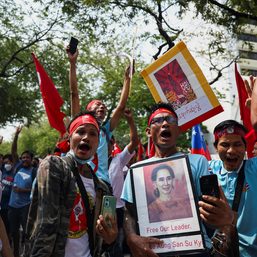
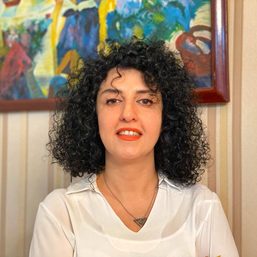
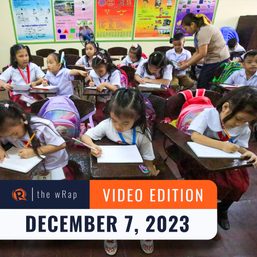
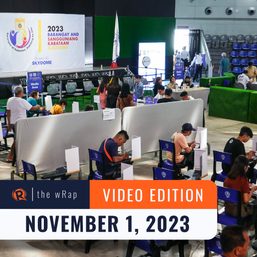

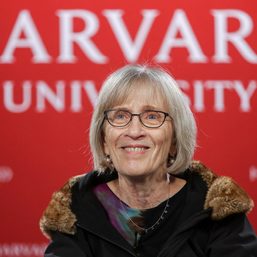
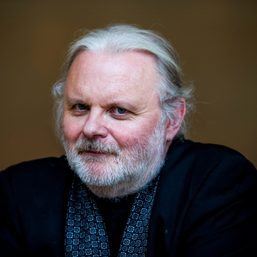
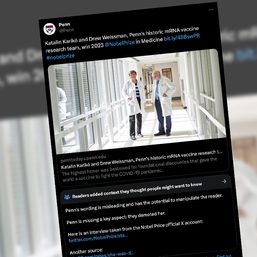
There are no comments yet. Add your comment to start the conversation.